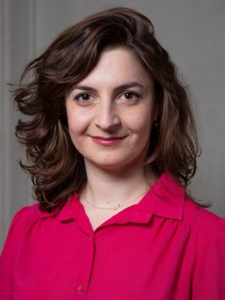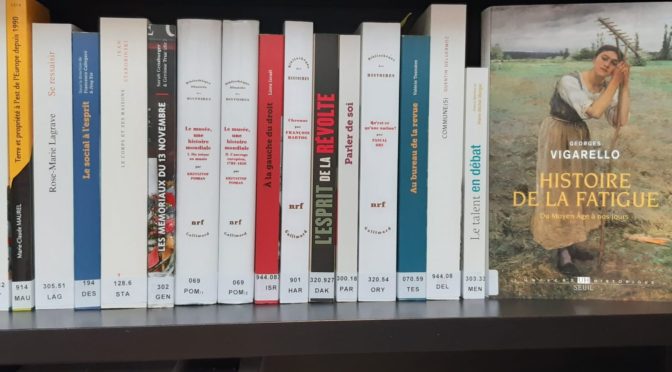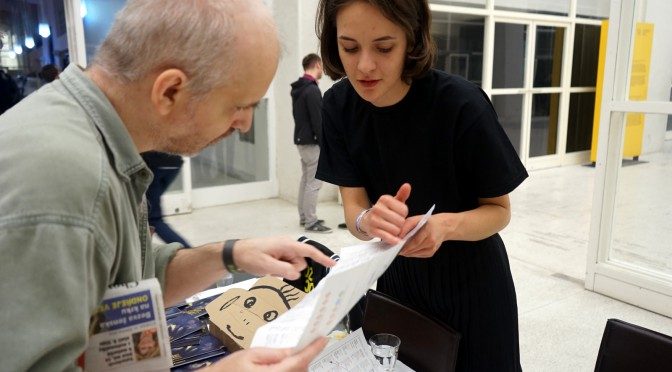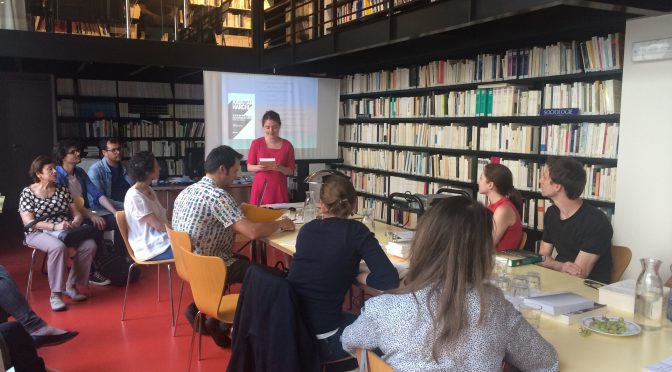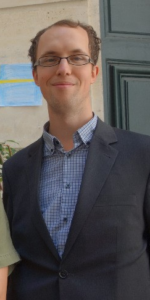Romanian intellectuals and the debates on democracy in Central Eastern Europe in transnational perspective
Research Area 1, “Displacements, “Dépaysements” and Discrepancies: People, Knowledge and Practices”.
Anemona Constantin is a political sociologist by training. She holds a Ph.D. in political science from the University of Paris Nanterre (2019), where she taught seminars in political science and social history of ideas for MA and BA students (2006-2011). Her works examine the transformations of the Romanian intellectual field after 1989, the public debates around the political past that sparked in Eastern Europe during the post-socialist period, and the (re)-writing of national histories after the fall of the Berlin Wall in Romania, Bulgaria, and the Republic of Moldova.
The project conducted at CEFRES examines in a transnational perspective the contributions of Romanian intellectuals to the political debates on democracy and Europe after the demise of state socialism. The project brings four innovations to the literature on intellectuals in CEE: 1) It maps the diversity of Romanian intellectual networks and discourses on democracy and provides a prosopography of these actors with their transnational collaborations; 2) It historicizes the diverse (national and transnational) roots of these discourses and place them in the long history of the Cold War period; 3) It investigates the direct and indirect impact of Romanian intellectuals on the ideology and activity of national political parties; 4) It places the Romanian case study in wider CEE trends in order to evaluate the potential peculiarity of Romanian intellectuals and ideas within the regional phenomenon.
CV
Education
2019: PhD in Political Science, University of Paris Nanterre, Thesis: “Regime change and the genesis of a new official history in Romania. Battles over the fascist and the communist past after 1989”
2006: Postgraduate Diploma (DEA) in Comparative Political Sociology, University of Paris Nanterre, Dissertation: “The social conditions of the rallying to fascism of Romanian intellectuals during the 1930s”
2005: MA in Political Science, University of Paris Nanterre
Fellowships & Participation in Collective Research Projects
December 2020 – November 2021: Fellowship at the Research Institute of the University of Bucharest, Division: Social Sciences, Research Project: “The Internationalization of Romanian Anticommunism. Transnational Biographies and the Circulation of Knowledge”
May 2018 – Avril 2020 : Team member at University of Bucharest, Department of Political Science, Center for the Study Of Equal Opportunity Policies, Research Project Transitional Justice and Memory in Romania in Global Perspective, https://transnationalmemory.wordpress.com/our-project/. Research project: „Teaching the history of communism in Bulgaria, Romania and Republic of Moldova”
2016 – 2018 : Team member at University of Paris Nanterre, Department of Law and Political Science, French-British Research project LABEX “Les passés dans le présent” (France) and Arts and Humanities Research Council “Care for the Future” (UK) –Research Project The Criminalization of Dictatorial Pasts in Europe and Latin America in Global Perspective, https://criminalizationofdictatorialpasts.wordpress.com/about/, Research project: „Sighet Memorial of the victims of communism and the reception of Black Book of Communism in Romania”
Publications
Peer-Reviewed Articles
- “L’enseignement de l’histoire du communisme à l’Est : Bulgarie, Roumanie, République de Moldavie“, Passés Futurs, no 9, July 2021, https://www.politika.io/index.php/fr/article/lenseignement-lhistoire-du-communisme-a-lest
- (co-authored with Valentin Behr, Muriel Blaive, Laure Neumayer, Maté Zombory), “Anti-Communist Consensus: The Black Book of Communism in a Pan-European Perspective”, Special Issue „Transnational Activism and the Globalization of Anti-Communism after 1989”, Revue d’Études Comparatives Est-Ouest, vol. 51, no 2-3, 2020, https://www.cairn.info/revue-revue-d-etudes-comparatives-est-ouest-2020-2-page-55.htm.
- “Le Mémorial de Sighet entre ‘devoir de mémoire’ et contraintes de l’histoire. Analyse sociologique d’une réussite improbable”, Studia Politica. Romanian Political Science Review, 3, 2018, https://www.ssoar.info/ssoar/handle/document/60116.
Book chapters
- “L’influence des facteurs transnationaux sur l’enseignement de l’histoire du communisme en Roumanie“ in Marie Vergnon, Renaud d’Enfert, Frédéric Molle (eds.), Circulations en éducation. Passages, transferts, trajectoires, Grenoble, Presses Universitaires de Grenoble, 2021 (forthcoming)
- “Sortir du communisme : les dé-conversions politiques d’un ‘fils du peuple roumain’“ in Jean-Philippe Heurtin, Patrick Michel, (eds.), La conversion et ses convertis, Paris, Centre Maurice Halbwachs, Politika.io, 2021
- “Roumanie : des minériades à l’intégration européenne“ in Dominique Andolfatto and Sylvie Contrepois, Syndicats et dialogue social : les modèles occidentaux à l’épreuve, Bruxelles, Peter Lang, 2016
- “L’échec d’une « seconde Révolution » Place de l’Université (1990)“ in Jérôme Heurtaux, Cédric Pellen (eds.), 1989 à l’est de l’Europe. Une mémoire controversée, La Tour d’Aigues, Éditions de l’Aube, 2009
Encyclopedia and Handbook Entries
- “L’écriture de récits communs : les commissions d’historiens”, “L’Institut d’Investigation des Crimes du Communisme en Roumanie”, “La Commission Tismăneanu en Roumanie (2006)“ in Sophie Baby, Laure Neumayer, Fréderic Zalewski (eds.), Condamner le passé ? Mémoires des passés autoritaires en Europe et en Amérique latine (ebook), Nanterre, Presses Universitaires de Paris Nanterre, 2019

